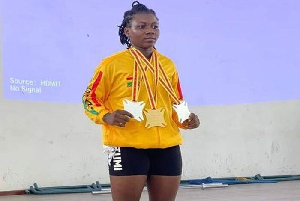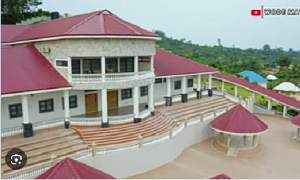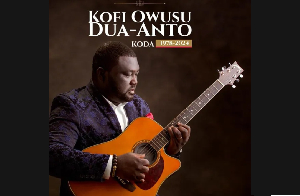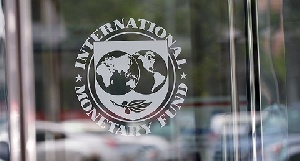Opinions of Wednesday, 23 June 2010
Columnist: Bokor, Michael J. K.
Of Rawlings and his “Vuvuzela” Politics
By Dr. Michael J.K. Bokor
E-mail: mjbokor@yahoo.com
June 21, 2010
Our people say that when water remains in the mouth for far too long, it turns into saliva and loses its appeal. At that point, it is not swallowed but spat out for what it is—unsavoury saliva. Who needs that?
Translated into politics, this proverb speaks volumes. Individuals who refuse to recognize that their political sun has set and hang around the public sphere, making the loudest, ugliest noise, easily lose their appeal and become public nuisance. Simply put, they incur the contempt of the people. Sooner than later, their accomplishments are brushed aside and they are written off like a bad debt. Like a “vuvuzela,” they draw attention to themselves only for the noise that they emit. Former President JJ Rawlings seems to be nearing that point. No single Ghanaian politician has raised himself to the level of a “vuvuzela” as Rawlings has done by making himself the Supreme Judge of Ghana politics, especially after leaving office in January 2001. Need I explain what a “vuvuzela” symbolizes? Too much noise, as we can confirm from the atmosphere at the 2010 World Cup tournament currently taking place in South Africa. To its credit, a “vuvuzela” is meant to inspire performers, although it can be jarring when overdone.
Rawlings does “vuvuzela” politics and must not be allowed to carry on unchallenged. His persistent deep chesty howls have not encouraged well-being. They have rather threatened all governments except his own. His “vuvuzela” bent always emits outbursts of wild anger, defiant torment, and contempt for all the leading figures of those governments. He seems to be working feverishly to erode all the goodwill that his positive accomplishments in office might have created. It is pathetic that by his own actions and unguarded utterances—and refusal to rein himself in and behave like a statesman—Rawlings is fast becoming a “living history” as a man of difficult-to-understand contradictions.
He began well—with well-intentioned agenda for ridding Ghana of corruption in high places and placing its administration on an even keel—even if the excesses of his governance seem to dominate public discourse and create enemies for him. The circumstances surrounding his failed attempt at overthrowing the Akuffo-led Supreme Military Council and his famous “Leave my men alone; I am responsible for everything” during his trial gave him so much presence in the public sphere that when he was catapulted to the top as Ghana’s Head of State under the AFRC, it was difficult to begrudge him his due, the tumultuous reign of his AFRC notwithstanding. Receding to the background after the 100 days of the AFRC, he re-emerged under the PNDC for a decade before transforming himself into a civilian President for almost another decade, thus becoming Ghana’s longest-serving Head of State! What a political career to write home about!
Such is the ramification of his role in Ghana’s political growth, although his political opponents continue to blame him for not doing much to solve the country’s problems all those years. They also accuse him of introducing indiscipline into the youth. His admirers, however, see things differently and are determined to defend him, even “to die for him.” Thus, Rawlings’ name is a household one and his image looms large over the Ghanaian political landscape even while he is consigned to the political wilderness. Like him or hate him for all that he superintended over in those years, you cannot wish him away. Out of office for many years now, Rawlings continues to attract attention for peculiar reasons. He is brazen in criticizing what he perceives as bad governance or what is not in the interest of the NDC as far as fulfilling the party’s electioneering campaign promises is concerned. His caustic verbal attacks on the ex-NPP administration under Kufuor and his particularly brutal condemnation of President Mills and the NDC government have combined to portray him as an acerbic character.
Among others, his critics have accused him of inciting the NDC’s foot-soldiers to agitate for the removal of certain government appointees from office and to demand that jobs be created for them; they have also accused him of encouraging factionalism within the NDC; and they have accused him of bad-mouthing the NDC government to make it unpopular. Thus, he is regarded as not only intemperate and wrathful but is also being responsible for all the ongoing intra-party wranglings. Rawlings is now seen as providing the last straw that might break the back of the NDC’s political camel. He seems to care less and goes ahead to hit President Mills’ government where it hurts most. By that penchant, he seems to be saying or doing what confirms those allegations.
If he has poured all that scorn on personalities and gone unscathed, recent happenings indicate that his cup may soon be running over with unpleasant consequences for him and his wife who is rumoured as readying herself to dislodge President Mills as the NDC’s Presidential Candidate for the 2012 elections. Their critics in the NDC have begun baring their teeth and engaging the Rawlingses in a toe-to-toe wordy warfare whose repercussions will not be in the NDC’s favour. Matters are gradually boiling to a head. Then, out of nowhere, so-called friends of the Rawlingses have begun issuing threats: “A group calling itself Friends of Nana Konadu Agyemang-Rawlings (FONKAR) has warned members of government who have criticized the former first couple for comments they make. The group mentioned Communications Minister Haruna Iddrisu, Deputy Information Minister Samuel Okudzeto Ablakwa, and Deputy Science and Environment Minister Dr Omane Boamah as some of the government appointees making disparaging remarks about the Rawlingses.
It has asked the party leadership to halt the attack on the Rawlingses, failing which they would advise themselves. ‘FONKAR believes such comments are reckless, irresponsible, very reprehensible and unbecoming of Ministers of State. We find it unacceptable the behavior of these Ministers and call on lovers of decency in our great party to come down very hard on the ‘FILTH’ associated with these Ministers,’ a press release by the group stated” (MyJoyOnline, June 18, 2010). My response to this threat is simple: Ransford Vanni-Amoah, founder of the group, must have misplaced his thinking cap to make him issue such a press statement. Somebody needs to set it right for him to know that nothing comes out of nothing—as the Greeks have it. Where has he been all these years that the Rawlingses have taken undue umbrage at others (national leaders, especially) and lambasted them just because they felt they were who they were? Does Vanni-Amoah ever know what pain Rawlings has caused others by using foul language against them (or physically assaulting them) and by creating tension here and there? Does Rawlings know decency in dealing with those he easily puts on the spot? I will stick my neck out to say that ever since early 2001 when Rawlings delivered his “BOOM” speech in Kumasi and followed up with acrid verbal attacks on ex-President Kufuor (“Nii Ayi nie… Kufuor nie…”) and his new-found easy target (President Mills), he has muddied the waters and must not expect to be left alone. I am not even talking about all the toes that he has stepped on since June 4, 1979. Indeed, if anything at all, it is Rawlings who should be told in a plain language to understand that he has over-stretched the patience of Ghanaians for far too long. He has to be told straight to his face that by refusing to heed advice to be continent and circumspect in his public utterances and posture, he has created favourable conditions for whatever fate now befalls him. His reputation is in tatters, say to speak.
Indeed, it is disheartening to hear the disparaging comments that people make about him despite all the sacrifices that he has made to bring Ghana to where it is today. Equally dispiriting is the fast rate at which Rawlings is demoting himself just because he has refused to know his station in Ghana politics. It is pathetic that he should be the first to begin destroying his own image just because he cannot draw the line between his former role in Ghana politics and the constitutional provisions that have given others the opportunity to administer the affairs of the country. If he does, he will act with decorous restraint.
No one is saying that Rawlings shouldn’t express his opinions on national issues. Far from that. However, what he does as a demonstration of patriotism and an enjoyment of his freedom of speech must not fall foul of norms. His approach is abrasive and lacks decorum. That’s the beef that some of us have with his manner of reacting to happenings even though we know that he comes across as someone who wants the betterment of Ghana. It is this abrasiveness that has driven a wedge between him and many of those who worked tirelessly to entrench him in office (and life) only to be pooh-poohed by him. Most have deserted him, which is unfortunate.
There have been many moments of epiphany, which he should have recognized by now and not allowed to elude him. What escapes him is that he, particularly, has more questions to answer than those he has not ceased abusing and calumniating. If he couldn’t solve the country’s problems in the almost two decades that he ruled, how can he expect others who have only four years (or a maximum of eight years) to do so? What moral justification does he have to cast the first stone or to undermine President Mills’ government, for example?
For as long as Rawlings will not refrain from making himself the Supreme Judge of Ghana politics, he should expect people to take him on. Ghanaians know that he has already had his chance and must step aside for those mandated to govern the country. But he doesn’t want to do so and has turned himself into a “vuvuzela,” making the loudest, ugliest noise. If he stubbornly insists on calling the shots, he will not be spared. Vitriolic opposition to him should make it clear to him that he is no more the proverbial water in the mouth but saliva that has no more room in the mouth. He has already been spat out. It’s as simple as that.
Solving the problem between his household and his critics doesn’t lie in using frontmen to issue threats but in listening to reason and knowing when to hob-nob in finding solutions to intra-party problems or in dealing with the Mills government. Neither does it lie in the acrid scorn that he pours on all those he disagrees with. Surely, his action of discrediting those he disagrees with will beget the kind of reaction that seems to be unsettling his household. No one can prevent him from lying on the bed he has laid.
Rawlings should work hard to redeem his image and come across in a better light instead of being a “vuvuzela” politician. Then, he will emerge as someone to be appreciated and not derided or condemned at will. He has had the benefit of leading Ghanaians for nearly 20 years and could not solve all their existential problems. He must recognize that reality and recede to the background to give others the peace of mind they need to register their impact on national life. Rawlings should be content with his accomplishments for the country and resign himself to fate. However, if he chooses to persistently gore every ox that he comes across, he must be prepared for the consequences. He will surely continue to incur the contempt of the people and must not blame anybody for it. If that is what he has reduced himself to, so be it. No amount of “vuvuzela” politics can prevent people from taking him on.












